Article Source: http://www.cnn.com/2016/03/22/europe/brussels-explosions/
(CNN)Three explosions that ripped through the Belgian capital of Brussels on Tuesday killed at least 34 people and wounded about 170 more, according to Belgian media, and raised the reality of terror once again in the heart of Europe.
"We were fearing terrorist attacks, and that has now happened," Belgian Prime Minister Charles Michel told reporters.
Belgian federal Prosecutor Frederic Van Leeuw said late Tuesday morning that it was too soon to know exactly how many people died in the bombings. Yet Belgian state broadcaster RTBF, citing emergency services, reported 20 dead at the Maelbeek metro station and 14 more killed at Brussels' international airport.
After the blasts, Belgian authorities hit the streets looking for those tied to Tuesday's carnage and who might launch more attacks.
Citing judicial sources, RTBF reported that raids were underway midday Tuesday around Brussels, targeting people linked to the attacks. Around 4 p.m. (11 a.m. ET), the network said new raids were taking place in the northeast Brussels district of Schaerbeek.
And hours earlier at the international airport, a controlled explosion was heard after troops zeroed in on a suspicious package, according to the Belgian crisis center.
Belgian authorities have given their U.S. counterparts pictures of possible suspects -- three men pushing luggage carts -- in Tuesday's attacks, a U.S. law enforcement official said.
A statement posted by the ISIS-affiliated Amaq news agency Tuesday said that ISIS fighters carried out the attacks and that Belgium is "participating in the international coalition against the Islamic State." In fact, Belgian warplanes flew 796 flights and launched 163 attacks over Iraq from September 2014 to July 2015 and were set to resume these operations this summer, the global coalition against ISIS has reported.
One widely circulated Twitter post among prominent ISIS backers featured the words, "What will be coming is worse."
Belgium is no stranger to terror. Just a few days ago, authorities there captured Europe's most wanted man, Salah Abdeslam -- the latest of many suspected terrorists caught in the small European country. And a U.S. counterterrorism official said, "The Belgians have been sitting on a ticking time bomb," given all those who have gone to Syria and Iraq to join ISIS, then possibly come back home.
Still, these facts don't take away the shock and horror of those who lived through Tuesday's carnage.
"You cannot believe it; you cannot believe it," said Jef Versele, who was in the airport's departure hall when bombs exploded there. "It was so insane. Not in my backyard."
Brussels man: 'It was a matter of time'
At least one of the two airport explosions was a suicide bombing, Van Leeuw said. A blast happened there outside the security checkpoints for ticketed passengers and near the airline check-in counters, an airline official briefed on the situation said.
The subway station blast happened in the Brussels district of Maelbeek, near the European Quarter, where much of the European Union is based.
Richard Medic, who arrived at the metro station shortly after that explosion, wasn't surprised by the carnage after all that Europe has gone through recently, including November's massacre in Paris that ISIS claimed responsibility for.
"I think, after the Paris attacks, we were assuming something like this would happen," the Brussels resident told CNN. "And it was a matter of time."
Yet Versele, the airport witness, said that he thinks Belgians should not hole themselves up.
Instead, he said, they should continue to live their lives and travel "to prove that we're not afraid of those who have done (the attacks)."
Two nuclear power plants evacuated
Belgian authorities bolstered security after Tuesday's attacks, including shutting down all Brussels metro stations and evacuating the city's airport.
This comes as the terror threat level in Belgium went up to four -- its highest. That step-up means that army soldiers can be sent onto the streets to meet security needs.
In addition to the airport's evacuation, subway transit around Brussels stopped and several of the city's top shopping centers closed Tuesday and perhaps beyond, RTBF reported.
The broadcaster also said the National Pensions Office in Brussels was cleared after two suspicious packages were found inside.
All but essential staff were sent home from two nuclear power plants in Belgium -- one in Tihange and the other in Doel, said a representative of Engie, the French company that operates the facilities. Belgian authorities ordered this evacuation, though the representative did not provide further details.
The effects of Tuesday's attacks have been felt outside the Belgian capital as well.
As far away as the United States, authorities in places like New York, Washington, Chicago and Los Angeles took special precautions like increased K9 sweeps of subways and additional police patrols. This was especially true around airports, subway stops and train stations, with scenes like those in the U.S. capital -- where police pulled out and checked travelers at random -- not uncommon.
"This is yet another reminder that the world must unite," U.S. President Barack Obama said from Cuba, where he's on a historic visit. "We must be together regardless of nationality or race or faith in fighting against the scourge of terrorism."
European calls for solidarity
NATO, the military alliance that is headquartered in Brussels, increased its own alert level and expressed solidarity with Belgium.
"This is a cowardly attack, an attack on our values and on our open societies," NATO Secretary General Jens Stoltenberg said in a statement. "Terrorism will not defeat democracy and take away our freedoms."
As in other places, British authorities ordered an increased police presence at ports, airports, Tube stations and international train stations, said Prime Minister David Cameron.
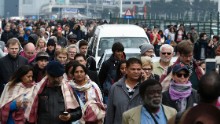


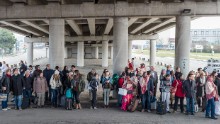
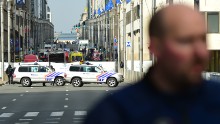
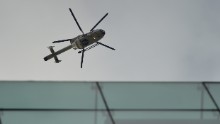

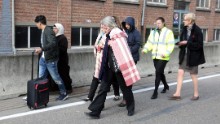

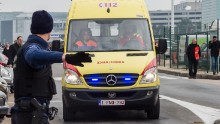


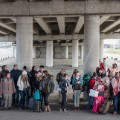
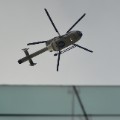
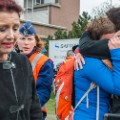
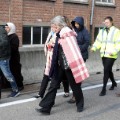

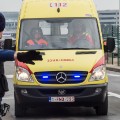
No comments:
Post a Comment